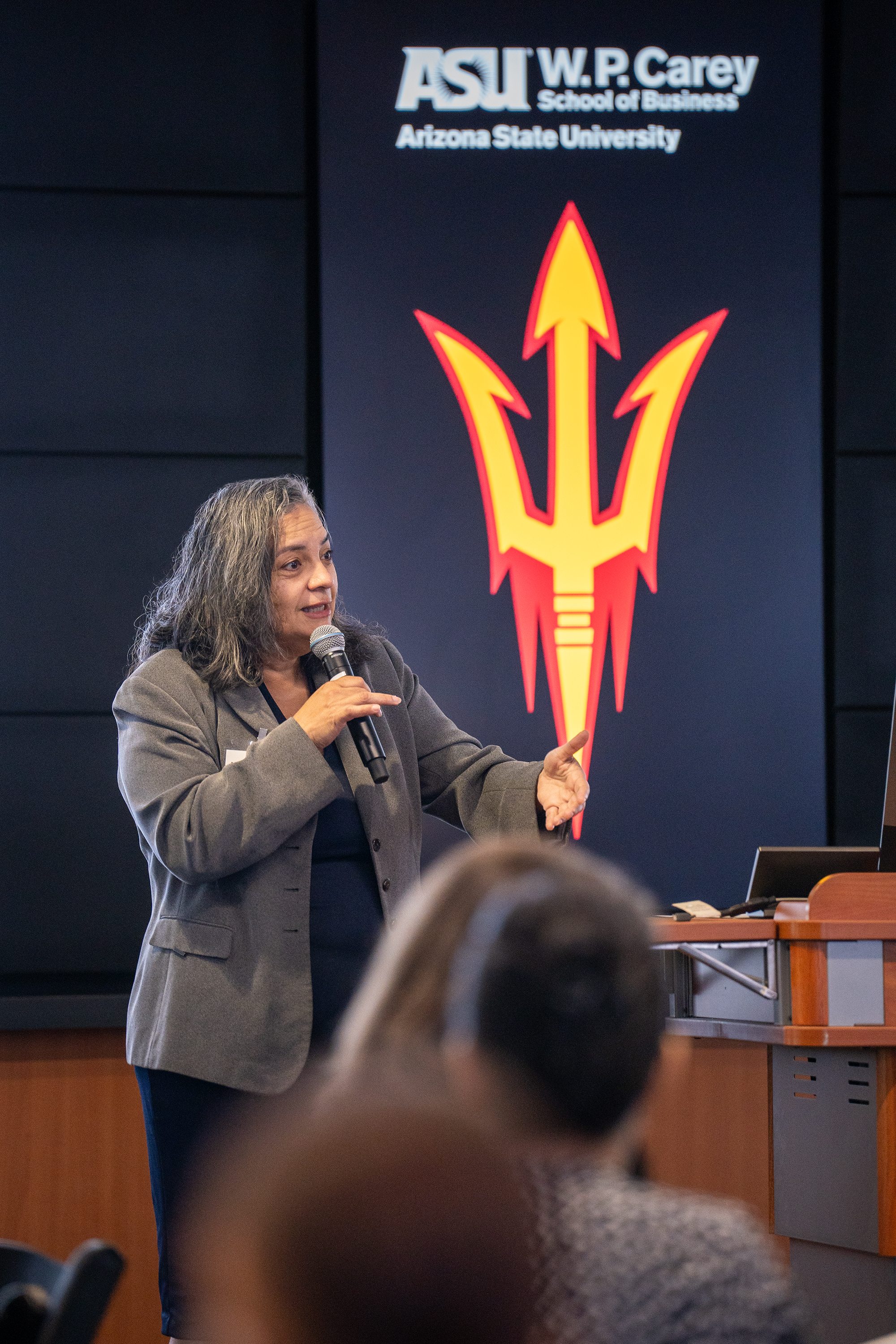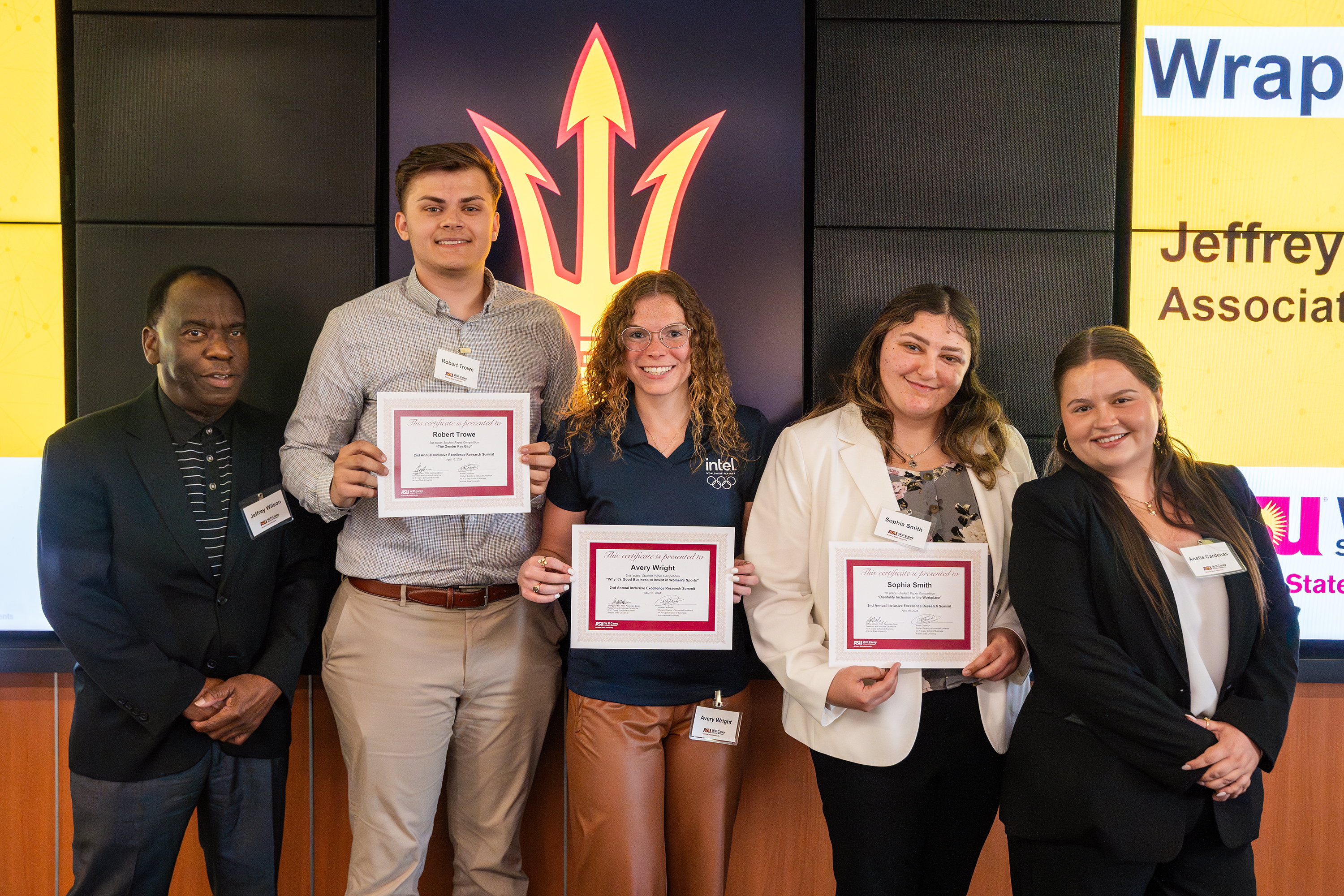
Second annual Inclusive Excellence Research Summit examines inclusivity in business, health, and the arts
Speakers from ASU gathered to discuss their research in accessibility and innovation.
On April 16, W. P. Carey hosted its second annual Inclusive Excellence Research Summit, an interdisciplinary event featuring leading ASU researchers in accessibility, research impact, and innovation in business knowledge. The W. P. Carey Council for Inclusive Excellence (IEC), an advisory group of 30 business school faculty and staff from various units and departments dedicated to fostering an inclusive culture at W. P. Carey, organized the event. Led by Jeffrey Wilson, the associate dean for research and inclusive excellence, the council focuses on collaboration. Three IEC directors represent the school's primary constituent groups: faculty, staff, and students, including Faculty Director of Inclusive Excellence and Professor of Economics Manjira Datta, Director of Human Resources and Inclusive Excellence Jennifer Mareiro, and Student Director of Inclusive Excellence Anette Fabiola Cardenas Steplewski.
"At W. P. Carey, we recognize that the pursuit of inclusive excellence is not merely an ideal but a rigorous intellectual journey that spans disciplines and touches lives," said Wilson. This summit exemplifies our commitment to that journey, showcasing a confluence of research and practice that informs better policies, products, and interactions in increasingly diverse environments. By integrating inclusivity into every facet of our work, we don't just change business — we change society."
Faculty and PhD students from W. P. Carey, the Provost's Office, the School of Music, Dance, and Theater, and the College of Health Solutions presented inclusive excellence research from retail, health care, community engagement, agribusiness, and small businesses.

Conference speakers included Vice Provost for Inclusive Excellence Amalia Pallares, whose presentation "Creating a Framework for Inclusive Excellence" outlined inclusivity in the workplace through research-informed strategies for combating bias in hiring programs, promotion and tenure, teaching evaluations, and student support related to the institution's political and social context and history. Pallares said creating value-informed priorities, specific objectives, an action plan, and accountability mechanisms help create workplace guidelines that encourage inclusivity.
"A final result is not the only determinant that you're accountable. Accountability is constantly engaging in the mental work, figuring out what works and what doesn't, and adjusting as needed," said Pallares. "If you can show that effort is happening, then you are being accountable and listening to those impacted."
Andrea Morales, Dr. Lonnie L. Ostrom Chair and marketing professor, presented on marketplace inclusion and consumers' — specifically consumers who are people of color — increased demand for inclusive products. Morales' research examines whether promoting POC-focused products, designed to accommodate physical features correlated with people of color, is more effective with or without race labeling. The study focused on four products — bandaids, reading glasses, eyelash curlers, and kinesiology tape — and found that race labeling is a less effective marketing strategy because it discredits a company's commitment to inclusivity. However, when a company demonstrates genuine commitment to supporting POC consumers in other ways, such as highlighting an ingroup product creator or incurring a financial cost to benefit POC consumers, this negative effect of race labeling can be attenuated.
Assistant Professor of Health Services Research Tiffany Lemon discussed health policy's impact on health equity and quality of life. Lemon described the methodological approaches she uses to responsibly and equitably investigate consumers' access to health care policies, like Medicaid, and other factors that impact health care accessibility, such as internet access and health literacy.
Robert Farid Karimi, assistant professor of music, dance, and theater, creates playful experiences that nourish communities, break down social barriers, and encourage dialogue around serious topics. Karimi described how several of his projects — like Diabetes of Democracy, a culinary engagement project that inspired audiences to connect through humor and food — help people combat stigma while engaging with their communities.
Mikaella Polyviou and Robert Wiedmer, assistant professors of supply chain management, presented on the selection and performance of small and diverse suppliers to determine the success of government set-asides for small businesses. They explained that the federal government sets aside contract dollars reserved specifically for diverse suppliers or companies, at least 51% owned by an individual or group from a traditionally underrepresented background. Set-asides encourage diverse suppliers to participate in the economy, increase jobs in under-represented communities, and contribute to socioeconomic development. Still, they are also controversial, with critics claiming they limit competition, reduce cost efficiency, and participate in "reverse discrimination." Polyviou and Wiedmer's research found that set-asides positively impact small and diverse suppliers, and their performance does not significantly differ from that of businesses that do not qualify for set-asides.
"This mechanism attracts competition — and good competition," said Polyviou.
Alexis Villacis, assistant professor at the Morrison School of Agribusiness, shared his research about gender inequities in agrifood systems — which are a significant employer of women globally — and how these inequities cause women to fall behind men in terms of working conditions, land access, services, finances, and digital technology. Villacis examined whether agricultural production aspirations differ by gender by drawing on evidence from Ecuador, Kenya, and Rwanda. He found that gender disparities in agrifood systems negatively impact women's daily experiences and substantially influence and shape their future aspirations.
Jaweriah Hazrana, a postdoctoral research scholar at the Morrison School of Agribusiness, discussed her research with Ashok Mishra, professor and Kemper and Ethel Marley Foundation Chair in Food Management at the Morrison School of Agribusiness, which focuses on how climate change creates gender disparity through food consumption and nutrition. Hazrana investigated how diet quality, diversity, nutrition, and stability impacted individuals of different genders in households affected by food insecurity due to droughts, which have emerged as a major factor impacting food security and threatening global and local food systems. Hazrana found that the average intake of any nutrients by adult males was at least 30% higher than that of their female counterparts, with elderly males favored over elderly females and boys over girls in food allocation decisions.

Postdoctoral Research Scholar of Economics Mahdi Eghbali's presentation "Are Immigrant Entrepreneurs Magnets for Foreign Investors?" investigated and compared the growth of equity financing between international and domestic investors. Eghbali found that immigrant-founded firms often raise international capital from their home countries, and global investors are more likely to invest in companies founded by entrepreneurs from their home countries.
The conference concluded with presentations by the winners of the inaugural student inclusive excellence essay competition. The competition encouraged students to think and write about inclusive excellence in business in a 1,500-word paper judged on its quality of analysis, writing, and originality. Sophia Smith (BA Business Law '24) took first place in the competition and presented her essay on disability inclusion in the workplace. Avery Wright (BA Sports Business/BS Marketing '25) took second place and discussed the importance of investing in women's sports, and Robert Trowe (BS Finance '25) took third place and presented on the gender pay gap.
First photo: Amalia Pallares.
Second photo: From left: Jeffrey Wilson, Robert Trowe, Avery Wright, Sophia Smith, Anette Fabiola Cardenas Steplewski.
Latest news
- Pop culture is key to effective teaching
How a management and entrepreneurship professor uses Ted Lasso and other pop-culture touchstones…
- Artificial intelligence in business master's degree helps Nathan Merriman combine business strategy with technology
Nathan Merriman (MS-AIB '25) had been working in business for a few years when he learned about…
- How the Executive MBA empowered Scott Gates to be a mission-driven leader
Scott Gates (BS Marketing '04, Executive MBA '15) had a very positive experience during his…